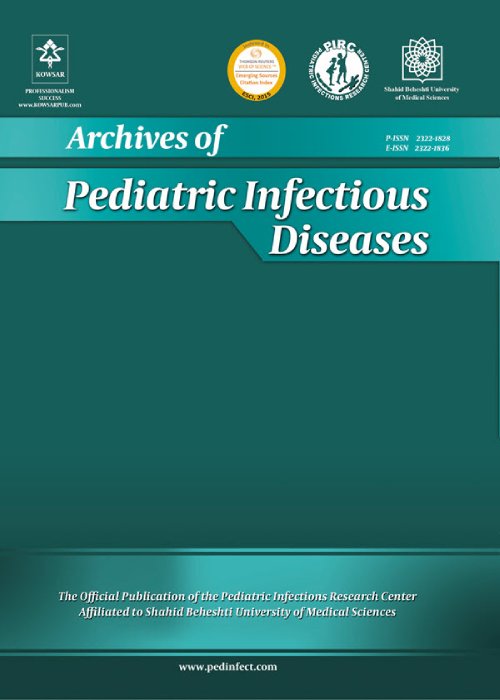Study of Cronobacter sakazakii Strains Isolated from Powdered Milk Infant Formula by Phenotypic and Molecular Methods in Iran
Author(s):
Abstract:
Background
Cronobacter is a genus within the family Enterobacteriaceae and was previously known as Enterobacter sakazakii. Cronobacter sakazakii is an opportunistic ubiquitous bacterium and is identified throughout the world as an emerging food-borne pathogen. This pathogen causes meningitis, necrotizing enterocolitis (NEC), and sepsis (septicemia) in patients hospitalized in neonatal intensive care units and has a high mortality and morbidity rate. Contamination of powdered infant milk formula occurs more easily because it is a nonsterilized product.Objectives
The aims of the present study were as follows: Isolation of Cronobacter sakazakii from powdered infant formula milk (PIF), confirmation of isolates by biochemical tests and polymerase chain reaction (PCR) molecular method, and characterization of an antibiotic susceptibility profile.Methods
A cross-sectional study was performed on 125 powdered infant formula milk (PIF) samples purchased from hospital drug stores between June 2014 and March 2015. Cronobacter sakazakii was recovered according to FDA protocol. For the final confirmation of isolates, different biochemical tests embedded in the API-20E kit system and manual biochemical tests were used according to the directions of the manufacturer. Antibiotic susceptibility testing was performed on Mueller-Hinton agar by disk diffusion method according to CLSI recommendations. For molecular confirmation of isolates confirmed by biochemical tests, PCR was performed on 16S rRNA gene specific for Cronobacter sakazakii.Results
Out of the 125 PIF samples investigated, nine (7.2%) of the samples were positive for Cronobacter sakazakii. All C. sakazakii strains isolated from PIF samples were uniformly susceptible to ticarcillin, chloramphenicol, levofloxacin, ciprofloxacin, moxifloxacin, cefepime, piperacillin-tazobactam, and colistin. All isolates were confirmed by PCR..Conclusions
Results showed that PIF that is being consumed in Iran is contaminated with this pathogen and can cause disease in infants; especially those hospitalized in neonatal intensive care units (NICUs) and fed PIF. The number of reported cases of Cronobacter infections is very low, but nevertheless there has been a slight increase recently. While the reported cases worldwide are few, it needs to be noted that the number of infections may be underestimated since not all clinical analysis laboratories carry out research on other bacterial pathogens, and not all countries have a system for reporting diseases.Keywords:
Language:
English
Published:
Archives of Pediatric Infectious Diseases, Volume:5 Issue: 1, Jan 2017
Page:
6
magiran.com/p1638095
دانلود و مطالعه متن این مقاله با یکی از روشهای زیر امکان پذیر است:
اشتراک شخصی
با عضویت و پرداخت آنلاین حق اشتراک یکساله به مبلغ 1,390,000ريال میتوانید 70 عنوان مطلب دانلود کنید!
اشتراک سازمانی
به کتابخانه دانشگاه یا محل کار خود پیشنهاد کنید تا اشتراک سازمانی این پایگاه را برای دسترسی نامحدود همه کاربران به متن مطالب تهیه نمایند!
توجه!
- حق عضویت دریافتی صرف حمایت از نشریات عضو و نگهداری، تکمیل و توسعه مگیران میشود.
- پرداخت حق اشتراک و دانلود مقالات اجازه بازنشر آن در سایر رسانههای چاپی و دیجیتال را به کاربر نمیدهد.
دسترسی سراسری کاربران دانشگاه پیام نور!
اعضای هیئت علمی و دانشجویان دانشگاه پیام نور در سراسر کشور، در صورت ثبت نام با ایمیل دانشگاهی، تا پایان فروردین ماه 1403 به مقالات سایت دسترسی خواهند داشت!
In order to view content subscription is required
Personal subscription
Subscribe magiran.com for 70 € euros via PayPal and download 70 articles during a year.
Organization subscription
Please contact us to subscribe your university or library for unlimited access!


